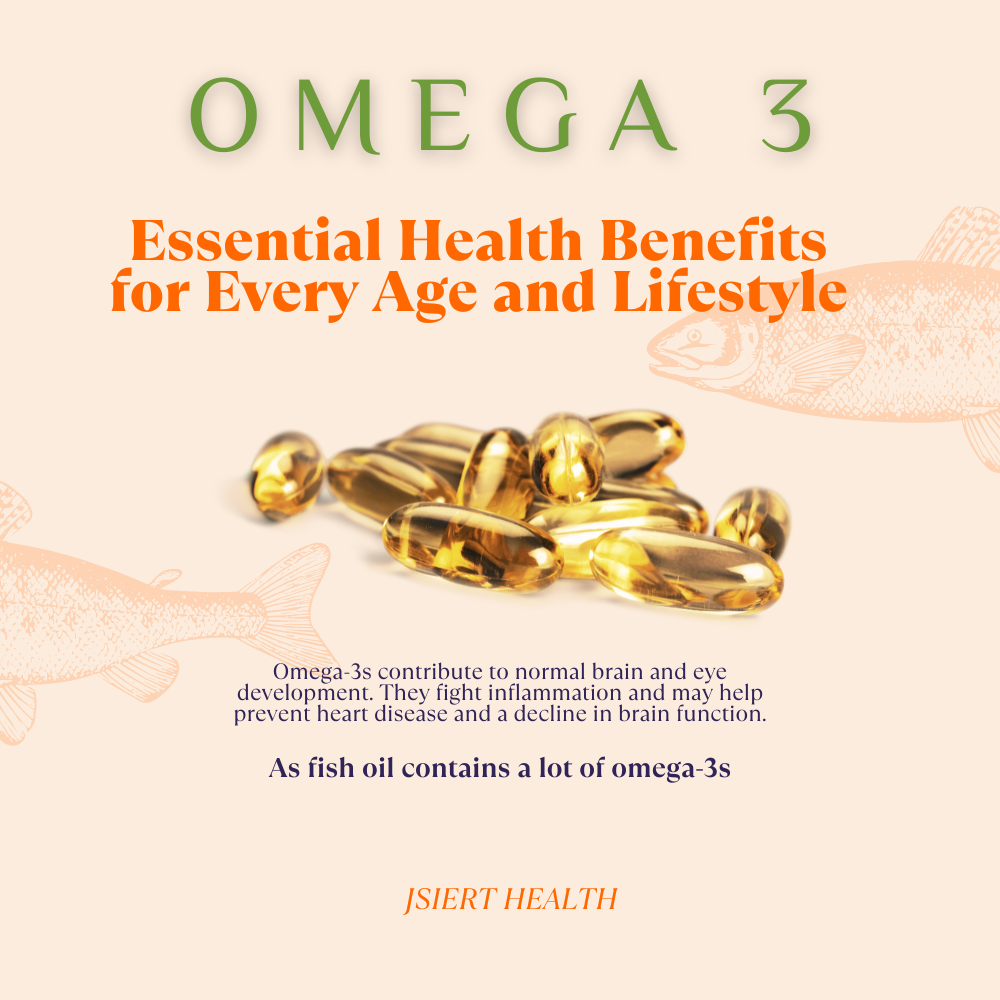Omega-3 for All: Essential Health Benefits for Every Age and Lifestyle
Introduction: Understanding Omega-3 Fatty Acids

Omega-3 fatty acids are a group of polyunsaturated fats that are vital to human health. The three main types of omega-3s are:
- ALA (Alpha-Linolenic Acid): Found in plant sources like flaxseeds, chia seeds, and walnuts, ALA is the most common omega-3 in the Western diet. The body can convert ALA into EPA and DHA, but this process is not very efficient.
- EPA (Eicosapentaenoic Acid): Primarily found in fatty fish and seafood, EPA plays a crucial role in reducing inflammation and supporting heart health.
- DHA (Docosahexaenoic Acid): Also found in fish and seafood, DHA is a major structural component of the brain, retina, and many other body parts.
Health Benefits Across All Age Groups
1. Infants and Children

- Brain Development: DHA is essential for the development of the brain and nervous system in infants. During pregnancy and breastfeeding, mothers are encouraged to consume adequate amounts of DHA to support their baby’s brain growth. Research indicates that infants with higher DHA levels tend to have better cognitive development and higher IQ scores.
- Visual Development: DHA is a major component of the retina, and sufficient intake during infancy is linked to better visual outcomes. This nutrient plays a critical role in the formation and function of the photoreceptor cells in the eyes.
- Immune System Support: Omega-3s contribute to the development of a healthy immune system in children, helping to protect against allergies and infections.
- Behavioral Benefits: Omega-3 supplementation has been associated with improved behavior, attention, and learning in children. Some studies suggest that omega-3s can help manage symptoms of ADHD, leading to better focus and academic performance.
2. Adolescents

- Mental Health: The adolescent years are a critical period for mental health, with increasing rates of depression and anxiety. Omega-3s, particularly EPA, have been shown to have a positive effect on mood disorders by reducing inflammation and supporting neurotransmitter function. They help maintain a healthy balance of brain chemicals such as serotonin and dopamine.
- Skin Health: Omega-3s help manage common skin issues like acne by reducing inflammation and promoting healthier skin. They also support the skin’s barrier function, helping to keep it hydrated and resilient against environmental stressors.
- Growth and Development: During adolescence, the body undergoes rapid growth, and omega-3s contribute to healthy development by supporting bone health, muscle function, and overall physical maturation.
3. Adults

- Cardiovascular Health: Omega-3s are well-known for their heart health benefits. They help lower triglyceride levels, reduce blood pressure, and improve cholesterol balance by increasing HDL (good) cholesterol while lowering LDL (bad) cholesterol. Omega-3s also prevent the formation of blood clots and reduce inflammation in the arteries, lowering the risk of heart disease and stroke.
- Anti-Inflammatory Effects: Chronic inflammation is a key factor in many diseases, including heart disease, cancer, and autoimmune disorders. Omega-3s, especially EPA, have powerful anti-inflammatory properties that can help reduce the risk of these conditions.
- Mental Health and Cognitive Function: Omega-3s play a crucial role in maintaining mental health. They have been found to reduce symptoms of depression, anxiety, and other mood disorders in adults. Regular consumption of omega-3s is also associated with improved cognitive function, memory, and a reduced risk of developing Alzheimer’s disease.
- Weight Management: Omega-3s may aid in weight management by improving metabolic health, reducing appetite, and promoting fat loss, particularly visceral fat that surrounds internal organs.
4. Elderly

- Bone and Joint Health: As people age, bone density tends to decrease, leading to a higher risk of osteoporosis and fractures. Omega-3s help maintain bone health by enhancing calcium absorption and reducing bone resorption, which is the process by which bone is broken down and its minerals released into the blood. Omega-3s also support joint health by reducing inflammation in conditions like arthritis, improving mobility and reducing pain.
- Eye Health: Age-related macular degeneration (AMD) is a common cause of vision loss in older adults. DHA, found in high concentrations in the retina, is crucial for maintaining eye health. Adequate intake of omega-3s can reduce the risk of AMD and other eye conditions, helping to preserve vision as one ages.
- Cognitive Preservation: Omega-3s, particularly DHA, are essential for maintaining brain function in the elderly. Regular intake is associated with a slower decline in cognitive abilities and a reduced risk of dementia and Alzheimer’s disease. Omega-3s help protect brain cells from damage and support communication between neurons, which is crucial for memory and learning.
- Heart Health: Omega-3s continue to provide cardiovascular benefits into old age, helping to reduce the risk of heart attacks and strokes. They also support overall vascular health, which is important for maintaining mobility and independence in older adults.
Omega-3 Sources
- Fatty Fish: Salmon, mackerel, sardines, tuna, and herring are among the best sources of EPA and DHA. These fish are rich in omega-3s and also provide other nutrients like vitamin D and selenium.
- Plant-Based Sources: For those who prefer plant-based options, flaxseeds, chia seeds, hemp seeds, and walnuts are excellent sources of ALA. Although ALA is less efficiently converted into EPA and DHA, these foods still contribute to overall omega-3 intake.
- Fortified Foods: Some foods, such as eggs, milk, and yogurt, are fortified with omega-3s, making it easier to include these essential fats in the diet.
- Supplements: Fish oil, krill oil, and algae oil supplements are popular options for those who do not get enough omega-3s from their diet. Algae oil is a particularly good choice for vegetarians and vegans as it provides DHA directly from a plant-based source.
Conclusion
Omega-3 fatty acids are crucial for maintaining health throughout life. From supporting brain and eye development in infants to preserving cognitive function and heart health in the elderly, omega-3s offer a wide range of benefits for everyone. Including omega-3-rich foods in your diet, or taking supplements if necessary, can help ensure you and your family receive the full spectrum of these essential nutrients’ health benefits. Whether you’re young or old, leading an active lifestyle or managing chronic health conditions, omega-3s are a vital component of overall wellness.
FAQ: Omega-3 for All
1. What are Omega-3 fatty acids, and why are they important?
Omega-3 fatty acids are essential polyunsaturated fats that play a critical role in maintaining overall health. They are important for brain development, heart health, reducing inflammation, and supporting the function of various body systems. Since the body cannot produce Omega-3s, they must be obtained through diet or supplements.
2. What are the main types of Omega-3s?
The three main types of Omega-3s are:
- ALA (Alpha-Linolenic Acid): Found in plant sources like flaxseeds and walnuts.
- EPA (Eicosapentaenoic Acid): Found in fatty fish like salmon and mackerel.
- DHA (Docosahexaenoic Acid): Also found in fatty fish, DHA is crucial for brain and eye health.
3. How much Omega-3 do I need daily?
The recommended daily intake of Omega-3 varies by age and health status:
- Infants (0-12 months): 0.5 grams of ALA per day.
- Children (1-8 years): 0.7 to 0.9 grams of ALA per day.
- Adults (including pregnant women): 1.1 to 1.6 grams of ALA per day.
- Older adults: Similar to adults, but with a focus on getting more EPA and DHA for heart and cognitive health.
4. What are the best sources of Omega-3s for vegetarians and vegans?
Vegetarians and vegans can get Omega-3s from plant-based sources such as:
- Flaxseeds and flaxseed oil
- Chia seeds
- Hemp seeds
- Walnuts
- Algae oil supplements (a direct source of DHA)
5. Can Omega-3s help with heart health?
Yes, Omega-3s are well-known for their heart health benefits. They help lower triglyceride levels, reduce blood pressure, decrease the risk of heart disease, and prevent arrhythmias (irregular heartbeats). Regular consumption of Omega-3s can significantly lower the risk of heart attacks and strokes.
6. Are Omega-3 supplements safe, and who should consider taking them?
Omega-3 supplements are generally safe for most people when taken as directed. They are particularly beneficial for individuals who do not consume enough Omega-3s through their diet, such as those who do not eat fish or have increased Omega-3 needs due to pregnancy or certain health conditions. However, it’s advisable to consult with a healthcare provider before starting any supplement regimen, especially if you have underlying health conditions or are taking other medications.
7. How do Omega-3s benefit brain health?
Omega-3s, especially DHA, are crucial for brain function. They support cognitive development in infants and children, improve memory and learning in adults, and help protect against cognitive decline and neurodegenerative diseases like Alzheimer’s in older adults.
8. Can Omega-3s help with joint pain and arthritis?
Yes, Omega-3s have anti-inflammatory properties that can help reduce symptoms of arthritis and joint pain. They can decrease morning stiffness, reduce the number of swollen joints, and enhance overall joint function, making them a valuable addition to the diet of individuals with rheumatoid arthritis or other inflammatory joint conditions.
9. How do Omega-3s support eye health?
DHA, a type of Omega-3, is a major structural component of the retina. Adequate Omega-3 intake can help prevent age-related macular degeneration (AMD) and other eye conditions, helping to maintain good vision throughout life.
10. What are the signs of Omega-3 deficiency?
Signs of Omega-3 deficiency can include dry skin, brittle hair and nails, difficulty concentrating, fatigue, joint pain, and mood swings. In severe cases, a deficiency may contribute to more serious health issues such as heart disease, depression, and cognitive decline.
11. Is there a risk of consuming too much Omega-3?
While Omega-3s are generally safe, excessive intake can lead to potential side effects such as blood thinning, increased bleeding risk, and gastrointestinal issues. It’s important to follow recommended dosages, especially if taking supplements, and to consult with a healthcare provider if you’re unsure about the appropriate amount.
12. How can I ensure my child gets enough Omega-3?
To ensure your child gets enough Omega-3, include foods like fatty fish, fortified eggs, and plant-based sources like flaxseeds in their diet. For children who are picky eaters or have dietary restrictions, Omega-3 supplements formulated for kids can be a good alternative, but always consult with a pediatrician before starting any supplement.